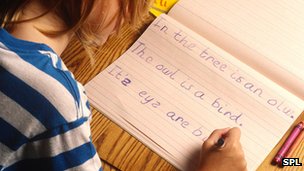Short lines of text on electronic devices may help some dyslexic readers increase their reading speed and comprehension, research suggests.
US scientists studied 100 pupils reading on paper and e-readers.
On the device, those who struggled most with sight-word reading read faster and those with limited visual attention spans had better comprehension.
The ability to display text in short lines with fewer words helped pupils focus on each word, they told Plos One.
Lead researcher Dr Matthew Schneps, from the Science Education Center at the Harvard-Smithsonian Center for Astrophysics, told BBC News: “The key factor that’s important in the effect being helpful is that there’s a few words per line.
“We think that could apply on paper, the blackboard or on any device.”
He said dyslexia came in many varieties, but some people may be helped by adjustments to the text that were visual in nature.
“If people are struggling to read they may want to try to simply blow the text up in their small computer-like device to see if having fewer words helps,” he said.
Commenting on the study, the British Dyslexia Association said e-book formats and readers were more accessible as they had a large range of font, size, spacing and colour options.
“They can also instantly provide definitions of words from built-in dictionaries,” a representative said.
“Additional text-to-speech software can make them even more accessible and ensure that reading is less challenging and remove the stigma that is so often associated for those who can’t read.”
Dyslexia
- Dyslexia is one of the most common learning difficulties
- In England, 4%-8% of schoolchildren thought to have some degree of dyslexia
- Dyslexia affects people of all ethnic backgrounds, although a person’s native language can play a role
- A language where there is a clear connection between how a word is written and how it sounds, and consistent grammatical rules, such as Italian and Spanish, can be easier for a person with dyslexia.
- Source: NHS Choices
Source: BBC News

![[SNEAK PEEK] THE SELECTION](https://blog.e-sentral.com/wp-content/themes/inunity/img/thumb-medium.png)